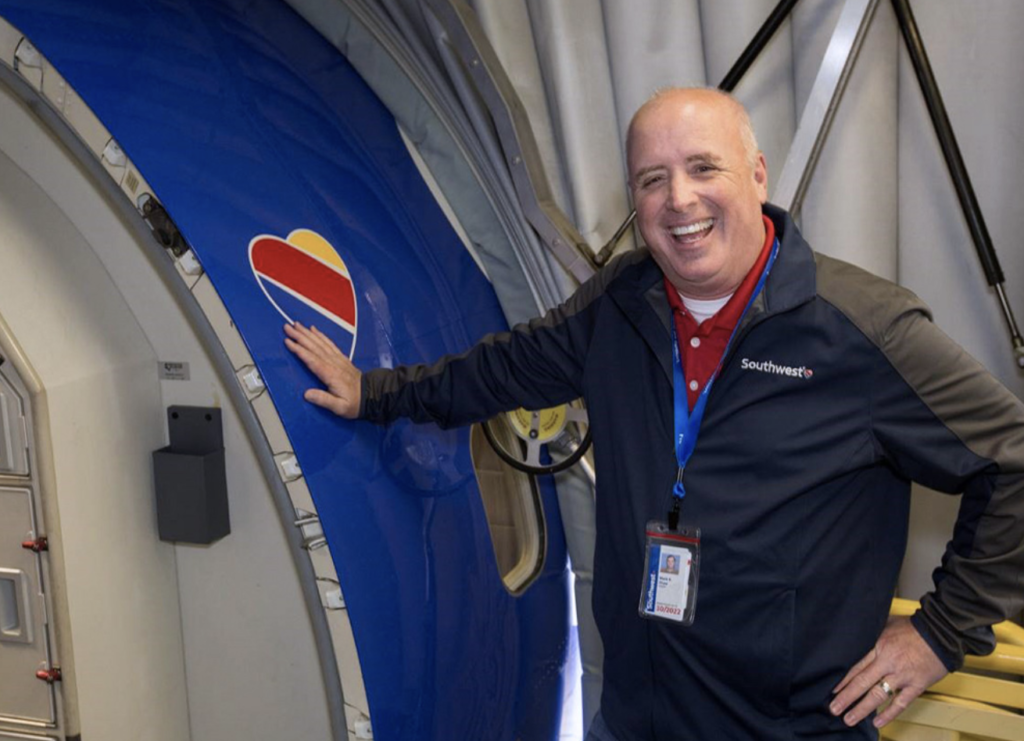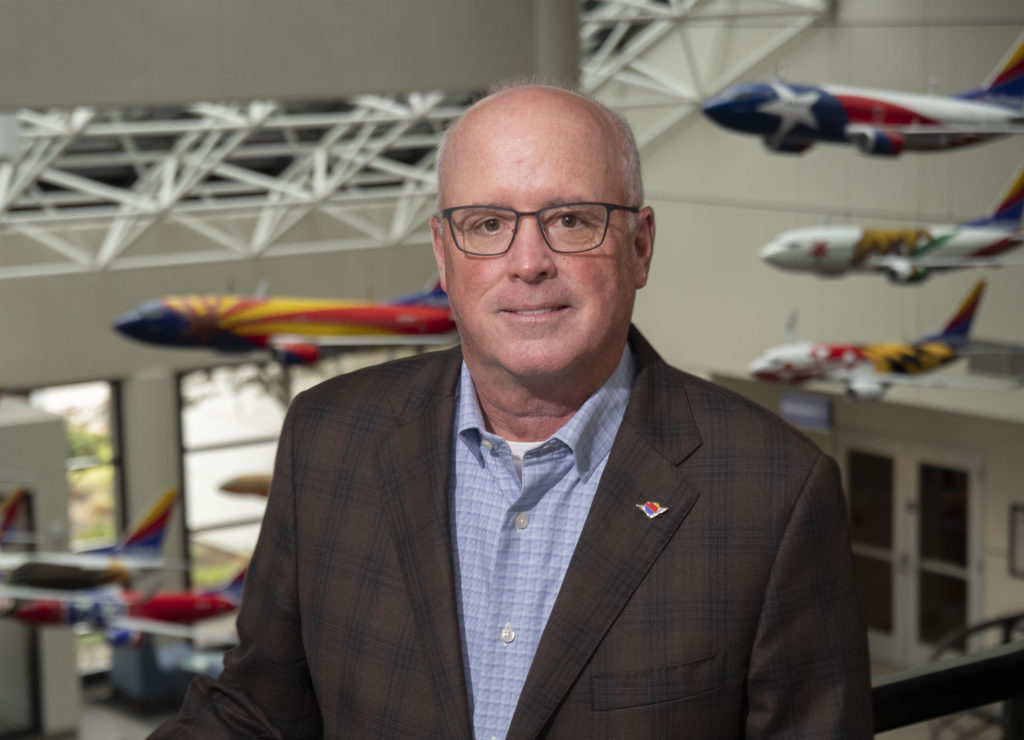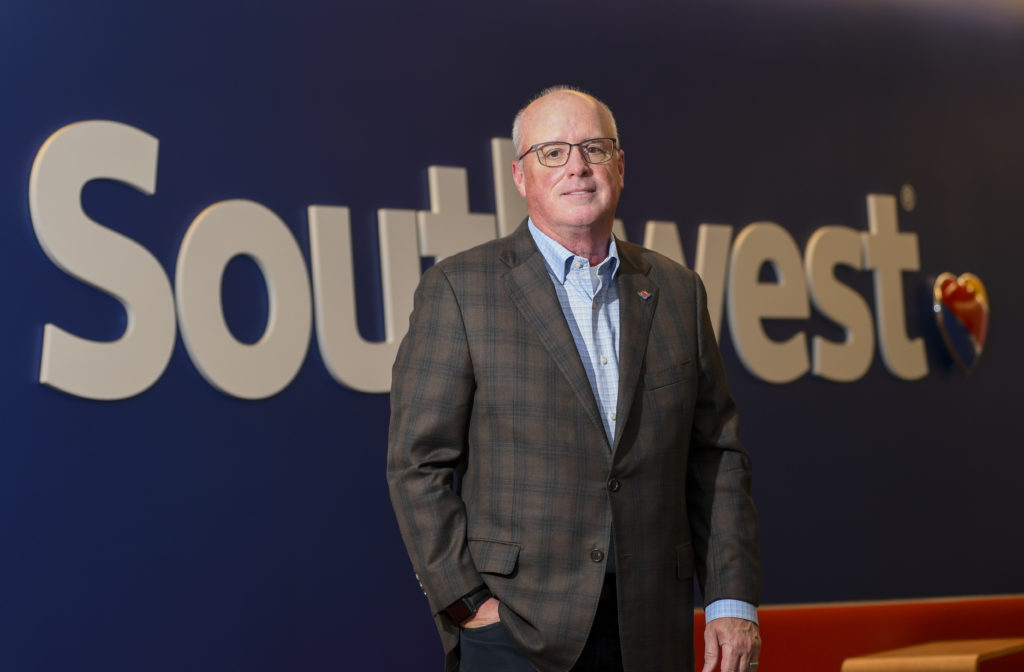
Mark Shaw still remembers his first day on the job as a lawyer at Southwest Airlines in July 2000.
“The entire legal team, which was probably only about 15 people total at the time, took me to lunch at Ojeda’s,” he recalls. “It was great fun and the whole team was so welcoming and friendly.”
Much has happened in the 21 years since.
Shaw has been promoted multiple times – first to associate general counsel over corporate and transactions, then to general counsel in 2013 and now chief legal and regulatory officer. Along the way, Southwest has added new responsibilities beyond the legal work, including governmental affairs, real estate and corporate facilities.
Then there have been the crises:
- The Sept. 11, 2001, terrorist attacks, which Shaw says still reverberate throughout the airline industry;
- The financial crisis of 2008, which sent even the most economically stable companies, including SWA, rushing for capital;
- Southwest’s $1.4 billion acquisition of AirTran Airlines in 2010, in which Shaw played a leading role; and
- The grounding of Boeing 737 Max planes in March 2019, which Shaw is still dealing with in litigation.
“We have seen a lot of crises and we have dealt with each, but there has been nothing like the Covid-19 pandemic,” Shaw told The Texas Lawbook in an exclusive interview. “This crisis has been the worst of them all from a financial standpoint, mainly for the uncertainty of it all.
PREMIUM SUBSCRIBERS CAN READ A SPECIAL Q&A WITH MARK SHAW BY CLICKING HERE.
“There was a sudden and steep decline in business and thus in revenues, and no one could accurately predict how long it would last,” he said.
The Southwest legal team, Shaw said, became front and center in dealing with nearly all aspects of the pandemic response.
There were multiple securities offerings of debt, equity and convertible notes, as well as loans and grants from the federal government that allowed SWA to raise an extraordinary $18.5 billion in capital in a period of a few months – money that airline industry experts say saved Southwest and nearly every other airline from massive layoffs or even possible bankruptcy.
In addition, Southwest expanded to 17 new airports last year, which required Shaw and his team to handle all the contracts and regulatory approvals needed to move into each of those destinations.
“The breadth of the issues that surfaced during the past year was unimaginable,” Shaw said. “The past year was by far my most difficult at Southwest because of all the different challenges.”
But many legal industry experts say 2020 was also Mark Shaw’s most successful year, as evidenced by the survival and health of an airline that transported more than 130 million passengers in 2019.
The DFW Chapter of the Association of Corporate Counsel and The Texas Lawbook have named Shaw as a finalist for the 2020 DFW Outstanding Corporate Counsel Award for General Counsel of the Year for a Large Legal Department. The finalists will be honored and the winners announced June 3 at the annual ceremony at the George W. Bush Institute.
Shaw said his team at Southwest, including corporate counsel Jason Shyung, who is a finalist for the Senior Counsel of the Year Award, deserves huge credit for the legal successes of the past year.
“Mark’s strong ability to lead has been particularly evident in the midst of the many activities he managed so that Southwest can weather Covid-19’s staggering effect on the airline industry,” said Vinson & Elkins partner Robert Kimball, who worked with Shaw on the securities offerings last year.
Kimball said that Shaw’s leadership allowed SWA to “boost its balance sheet and keep the company’s more than 60,000 employees on the payroll.”

Other lawyers agree.
“Mark’s diversity of experience gives him great perspective on complex legal issues facing a company like Southwest,” said Michael Wilson, a partner at the intellectual property boutique Munck Wilson Mandela, which represents SWA in patent and trademark matters. “Mark has a knack for understanding how legal decisions will impact different parts of the company, from employees to the bottom line.”
Prominent Dallas trial lawyer Dick Sayles, who is a partner at Bradley Arant Boult Cummings, said Shaw “consistently exercises sound judgment.”
“Without the distraction of emotion and without blindly seeking the result that would simply be the desired outcome, Mark is thoughtful, pragmatic and confident enough to call it like it is,” Sayles said. “Mark is a steady hand in the face of every challenge. He is honest with his executives and with the legal team. He is aggressive but at the right time, always balancing business considerations while calling the legal shots.”
Shaw, who is an avid golfer, bird hunter, fisherman, baseball fan and University of Texas Longhorns football addict, was born in Lockhart, Texas, a small town near Austin. His father worked for Shell Oil in the marketing and real estate areas. As a result, the family moved several times – Houston, Atlanta, Ft. Lauderdale and Valley Forge near Philadelphia.
“My mother was a homemaker and spent most of her time keeping me and my two brothers from fighting and getting into trouble,” he said. “Seriously, she was and is a great mother and has devoted her life to her family and her church. Same for my father – when he wasn’t working, he was spending time with his family and his church activities.”
After receiving his bachelor’s degree in journalism from the University of Texas in 1986, he worked as a reporter for the Amarillo Globe-News, where he covered the police beat and courts. He also worked as an editor for several months at the Waco Tribune.
“Working in those roles really got me thinking about going to law school, though at the time I didn’t necessarily think about going into criminal prosecution or defense work,” he said. “I just thought learning more about the law sounded interesting.”
Though he had no lawyers in his family, Shaw took the LSAT and scored high. His parents lived in the New Orleans area at the time, so he applied and was accepted to law school at Loyola University.
“Loyola turned out to be a great fit for me, and I truly value the legal education I got there,” he said.
After doing an externship with a federal bankruptcy judge, Shaw caught the eye of Akin Gump partner Dean Gandy, who was a former bankruptcy judge.
Shaw started at Akin Gump in 1990 in its bankruptcy practice, which he describes as “an amazing place to start my legal career.” One of the biggest matters he worked on during his time at Akin Gump came in 1992 when the firm represented Zale Corporation, the jeweler, in its Chapter 11 restructuring.
“It was certainly challenging and difficult on a regular basis, but it also gave me the opportunity to meet and work with some amazing people and clients, and to learn so much about being a lawyer,” he said.

“There were definitely months and years where I wondered how I could keep up the pace of hours and stress – and the travel and being away for long periods of time from my family were not fun at the time,” he said. “But I look back on my career there with the benefit of hindsight and really value all the opportunities I had there. It made me a better lawyer and was a great training ground.”
In 1996, Shaw made the move in-house, joining the legal department at Mary Kay. A year later, Shaw spent a year with GE Capital Aviation Services as part of a secondment. The financial firm moved Shaw and his family to Ireland for several months – a move that he said “had a big impact” on his life.
“I think it showed me that I could adapt to different cultures, to different work settings and could thrive in a place I never planned on being,” he said. “Working for GE Capital Aviation at that time was incredible – I learned a great deal about aircraft financing and leasing in my time there. We also got the opportunity to see a large part of Ireland during our time there, and it is a beautiful country.”
A few years ago, the Shaws took their daughter to Limerick, Ireland, to show her the house where she spent part of the first year of her life.
In 2000, a friend of Shaw told him about an opening in the legal department at Southwest Airlines. Shaw’s experience at GE Capital Aviation in financing and leasing aircraft caught the eye of SWA leaders and he was hired.
Not long after Shaw joined SWA, the airline shifted his focus to corporate finance and governance matters.
Shaw was on the job at Southwest’s headquarters at Love Field when the Sept. 11, 2001, terrorist attacks occurred – a day he called “by far the most surreal day to be working at an airline.”
“Even at SWA, it was a shocking awakening that these sorts of things could happen, and obviously it changed the airline industry in fundamental ways that we dealt with for many years after the fact, and to some extent are still dealing with on a daily basis – things like security and operational procedures,” he said. “Then the power in our building went out for about 15 minutes for some unrelated reason, which freaked people out. It is a day I will never forget.”
Shaw said he could not imagine the grief and heartache suffered by his crosstown competitors at American Airlines, which had two planes involved and several pilots and flight attendants murdered in the attacks.
In 2008, the stock market crashed, the Great Recession hit and capital markets closed. Shaw was right in the middle of it all.
“The financial crisis required us to do five transactions to raise capital, including several transactions involving sale-leasebacks of about 10 aircraft and a couple secured loan transactions,” he said.
Only two years later, Shaw played an early and leading role in Southwest’s acquisition of AirTran Airways for $1.4 billion – the largest M&A deal in the 54-year history of the Dallas-based airline.
“Navigating the AirTran acquisition was a huge deal for Southwest from the very beginning,” he said. “From negotiating the initial agreements all the way through the integration of AirTran into Southwest, it went smoothly. The biggest challenge was that Southwest was not a company that did a lot of acquisitions. We just didn’t have the experience in-house.”
Shaw turned to V&E to lead the AirTran transaction. In fact, V&E has represented the Dallas airline dating back to its initial public offering in 1971.
“The first matter I handled for Southwest was in 1972, when Southwest had only four airplanes flying to three cities in Texas and a market cap of $5 million,” said recently retired V&E partner Michael Harrington. “Southwest has always had a tremendous culture, and Mark Shaw, who is as nice and kind as he is brilliant, is a perfect example of the Southwest culture.”
Shaw and V&E’s Kimball, who worked hand in hand on the AirTran deal, said the integration of AirTran into Southwest was significantly more complex and time consuming than the acquisition itself.
The combination took more than a year and a half to combine the two fleets (AirTran had 140 planes) that required pilots and ground crew to be trained on both. There was the process of combining the unions and training the gate crews for AirTran about Southwest methods and procedures. And merging their reservation systems.
“It was an enormously complicated and sometimes tedious process,” Shaw said.
The next crisis hit Southwest in March 2019, when the Federal Aviation Administration grounded all 371 Boeing 737 Max planes for safety concerns. Southwest operated 34 of those jets.
In December 2019, Boeing agreed to pay SWA an estimated $125 million to help cover the airline’s financial loss for the grounding of the Max, according to multiple newspaper reports.
In addition, Southwest and Boeing are the targets of a federal RICO lawsuit brought by lawyers representing Southwest passengers claiming the two companies conspired to hide the dangers of the Max. Southwest denies any such conspiracy and has hired Norton Rose Fulbright to defend the airline in the litigation.
Then there is coronavirus.
Prior to the middle of March, Southwest had more than $4 billion cash on its balance sheet and an A-minus investment grade credit rating. As late as February, SWA was repurchasing stock.
During the third week of March, travel levels dropped to less 5%. There were days in late March and April when Southwest canceled more flights than it had takeoffs. Revenue plunged even though an airline’s expenses – airport leases, employees and maintenance of planes – are almost entirely fixed.
“The impact of Covid-19 on the airline industry was far worse than Sept. 11 and the 2008 financial crisis combined,” Shaw said.
Shaw said he and the legal team focused on key priorities, including safety measures on planes and in airports for employees and customers, identifying and implementing federal, state and local government restrictions, and obtaining the liquidity needed to get through the crisis.
Here is how quickly and substantively Southwest and V&E took action last year:
Late March: Borrowed $1 billion on a new 364-day term loan and drew down $1 billion on an existing credit facility;
Early April: Upgraded its 364-day term loan to obtain an additional $2.7 billion;
April 20: Obtained a $2.4 billion grant and a $976 million low-interest loan under the CARES Act, which required Southwest to prove up its payroll from 2019, agree to no layoffs and no salary increases for C-suite leaders;
April 28: Raised $2.3 billion through an offering of 80.5 million shares of common stock and another $2.3 billion through a debt offering of convertible senior notes;
April 29: Obtained another $2 billion through a debt offering;
May: Raised $610 million through a sale and leaseback on aircraft;
June: Secured another $1.8 billion through a debt offering, $200 million in an aircraft secured loan, and $205 million through a sale and leaseback of aircraft;
July: Raised another $1 billion via a debt offering; and
September: Obtained $125 million through another aircraft secured term loan.
In all, $18.5 billion.
“Robert and his team at V&E worked around the clock with the Southwest legal team to get the critical work done in a very, very tight time frame,” Shaw said. “The V&E team had an in-depth knowledge of the company, of our history, of our corporate governance and of the transactions we have done over the decades. That deep knowledge and expertise made things go quicker.”

Shaw also praised the work of Sidley Austin partner Kevin Lewis, who worked with the underwriters handling some of the notes.
“Kevin is a great lawyer who knows the airline industry better than just about any other lawyer,” Shaw said.
Wilson, the IP lawyer at Munck Wilson, said Shaw “hires good people and trusts them to do their job.”
“Mark has too many balls in the air to micromanage, so Mark takes the time to make sure he is surrounded by people with the right combination of legal skills and positive attitude, and then holds them accountable for good decisions and results,” Wilson said. “And coming from a transactional background, he understands how legal issues impact goals of the business.”
Kimball said he, Shaw and Shaw’s team were on a lot of 5 a.m. conference calls and experienced many nonstop daylong and near-all night work sessions without showers or shaving in March, April and May.
“Mark doesn’t feel that he has to be the star of the team,” Kimball said. “He has always stood out to me for his skill in setting strategy and overseeing critical companywide projects while embodying the famously friendly and fun culture at Southwest Airlines.”
What was the most frustrating part of his job during the past year?
“Some passengers refusing to wear a mask,” Shaw said. “A great majority of Southwest passengers completely understand and follow the rules, but I have been surprised by the number of people who refused to put on a mask even though they knew it was a condition of them boarding the flight and causing problems for our flight crews, who are just good honest people trying to do their job and uphold the law. For the life of me, I don’t understand it.”
